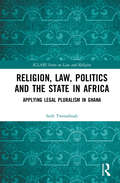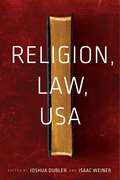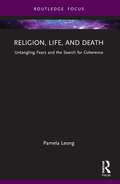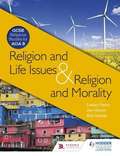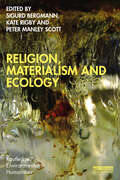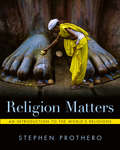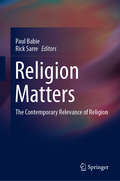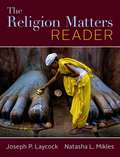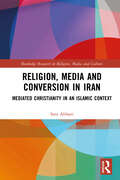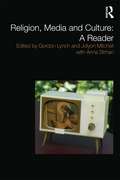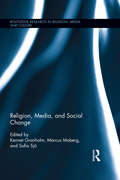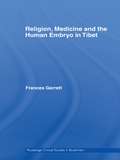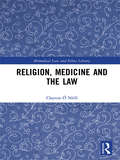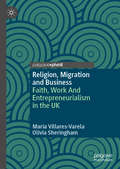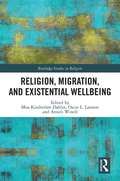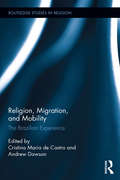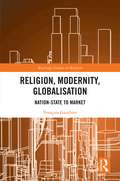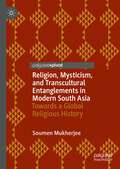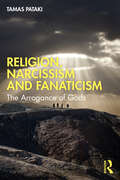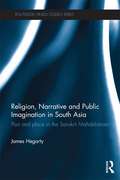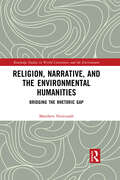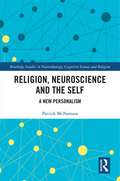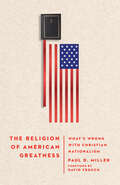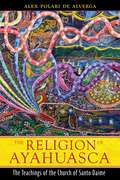- Table View
- List View
Religion, Law, Politics and the State in Africa: Applying Legal Pluralism in Ghana (ICLARS Series on Law and Religion)
by Seth TweneboahApplying a legal pluralist framework, this study examines the complex interrelationships between religion, law and politics in contemporary Ghana, a professedly secular State characterised by high levels of religiosity. It aims to explore legal, cultural and moral tensions created by overlapping loci of authority (state actors, traditional leaders and religious functionaries). It contends that religion can function as an impediment to Ghana’s secularity and also serve as an integral tool for realising the State’s legal ideals and meeting international human rights standards. Using three case studies – legal tensions, child witchcraft accusations and same-sex partnerships – the study illustrates the ways that the entangled and complicated connections between religion and law compound Ghana’s secular orientation. It suggests that legal pluralism is not a mere analytical framework for describing tensions, but ought to be seen as part of the solution. The study contributes to advancing knowledge in the area of the interrelationships between religion and law in contemporary African public domain. This book will be a valuable resource for those working in the areas of Law and Religion, Religious Studies, African Studies, Political Science, Legal Anthropology and Socio-legal Studies.
Religion, Law, USA (North American Religions #8)
by Isaac WeinerOffers insight into the complex relationship between religion and law in contemporary America Why religion? Why law? Why now? In recent years, the United States has witnessed a number of high-profile court cases involving religion, forcing Americans to grapple with questions regarding the relationship between religion and law. This volume maps the contemporary interplay of religion and law within the study of American religions. What rights are protected by the Constitution’s free exercise clause? What are the boundaries of religion, and what is the constitutional basis for protecting some religious beliefs but not others? What characterizes a religious-studies approach to religion and law today? What is gained by approaching law from the vantage point of religious studies, and what does attention to the law offer back to scholars of religion? Religion, Law, USA considers all these questions and more. Each chapter considers a specific keyword in the study of religion and law, such as “conscience,” “establishment,” “secularity,” and “personhood.” Contributors consider specific case studies related to each term, and then expand their analyses to discuss broader implications for the practice and study of American religion. Incorporating pieces from leading voices in the field, this book is an indispensable addition to the scholarship on religion and law in America.
Religion, Life, and Death: Untangling Fears and the Search for Coherence (Routledge Advances in Sociology)
by Pamela LeongBased on a content analysis of writing assignments from a class on death and dying, this book focuses on the manner in which college students use religion to make sense of death and the dying process. Drawing on research spanning five years, the author considers the attitudes, concerns, and beliefs about death, exploring students’ perspectives on the place of religion in end-of-life issues. With attention to questions related to death anxiety, suicide, mass homicide, and the death of young children, the author examines the ways in which students draw on religion to make sense of death, religion’s function as both a source of comfort and empowerment and a source of distress, as well as the perceptions of those who resist religion. As such, Religion, Life, and Death will appeal to social scientists with interests in the sociology of young adults, and the sociology and psychology of religion, death, and dying.
Religion & Life Issues and Religion & Morality
by Kim Hands Lesley Parry Jan HayesThe only book on the market combining the two most popular AQA B GCSE Religious Studies units; Religion and Life (Unit 2) and Religion and Morality (Unit 3), ensuring that students have everything they need in one place. - Helps students engage with the content by providing an informed view of issues which affect the lives of young people today - Guides students through exam preparation and develops their exam skills with revision outlines, Top Tips and techniques sections - Helps students understand the structure and types of questions in exams with a practice paper at the end of each unit - Provides a trusted resource informed by the expert authors' many years of experience providing AQA Religious Studies content
Religion, Materialism and Ecology (Routledge Environmental Humanities)
by Sigurd Bergmann, Kate Rigby and Peter Manley ScottThis timely collection of essays by leading international scholars across religious studies and the environmental humanities advances a lively discussion on materialism in its many forms. While there is little agreement on what ‘materialism’ means, it is evident that there is a resurgence in thinking about matter in more animated and active ways. The volume explores how debates concerning the new materialisms impinge on religious traditions and the extent to which religions, with their material culture and beliefs in the Divine within the material, can make a creative contribution to debates about ecological materialisms. Spanning a broad range of themes, including politics, architecture, hermeneutics, literature and religion, the book brings together a series of discussions on materialism in the context of diverse methodologies and approaches. The volume investigates a range of issues including space and place, hierarchy and relationality, the relationship between nature and society, human and other agencies, and worldviews and cultural values. Drawing on literary and critical theory, and queer, philosophical, theological and social theoretical approaches, this ground-breaking book will make an important contribution to the environmental humanities. It will be a key read for postgraduate students, researchers and scholars in religious studies, cultural anthropology, literary studies, philosophy and environmental studies.
Religion Matters: An Introduction To The World's Religions
by Stephen ProtheroBuilding religious literacy through the greatest stories ever told A religion is a system of stories, and there is no better way to engage with the world’s religions than through the stories that animate their beliefs and practices. Through the exploration of these ancient stories and contemporary practices, Stephen Prothero, a New York Times–bestselling author and gifted storyteller, helps students better grasp the role of religion in our fractured world and to develop greater religious literacy. This purchase offers access to the digital ebook only.
Religion Matters: The Contemporary Relevance of Religion
by Rick Sarre Paul BabieThis book draws together leaders in science, the health sciences, the humanities, and the social sciences to investigate the role of religion, its meaning and relevance, for their area of specialization. It provides a much-needed fresh perspective on the way in which religion operates within the modern, neo-liberal world. The book approaches the topic by way of a critical engagement between religion, broadly defined, and the individual disciplines in which each of the contributors is expert. Rather than simply taking the dogmatic position that religion offers something to every possible discipline, each of the chapters in this collection addresses the question: is there something that religion can offer to the discipline in question? That is the value of the book – it takes a truly critical stance on the place of religion in contemporary society.
The Religion Matters Reader
by Joseph Laycock Natasha MiklesThe Religion Matters Reader is an innovative (and inexpensive) complement to Stephen Prothero’s pathbreaking and enormously teachable introductory text. The readings are accessible, diverse, and tied to the organizing principles of RELIGION MATTERS. Each chapter includes five readings—problem/solution, technique, two exemplar profiles, and a controversy. A rich teaching tool created by the same authors who created the text’s supporting media resources.
Religion, Media and Conversion in Iran: Mediated Christianity in an Islamic Context (Routledge Research in Religion, Media and Culture)
by Sara AfshariReligion, Media and Conversion in Iran studies the reception of Farsi Christian television channels by Muslim audiences in Iran: their motivations in viewing the Christian message, their methods of interpretation and negotiation with different media texts and their process of changing or altering their religion. Rooted in empirical research, it analyses three hundred narratives drawn from the audiences of four Farsi Christian satellite television channels between 2010 and 2015, investigating their conversion to Christianity through that medium. The research examines factors that influenced both their interpretations of, and negotiations with, the religious media message, and their process of changing, adding to or modifying their belief system, including their understanding of religious conversion. Drawing on Reception Theory, the book investigates the negotiations between meaning making and mediation and the process of faith transformation against the background of the sociology of religion and culture in contemporary Iran. By offering a unique insight into the way in which media and religion influence each other, this book is a great resource for any scholar of Religious Studies, Media Studies and Middle East Studies and will also be useful for religious media practitioners.
Religion, Media and Culture: A Reader (Media, Religion And Culture Ser.)
by Gordon Lynch Jolyon Mitchell Anna StrhanThis Reader brings together a selection of key writings to explore the relationship between religion, media and cultures of everyday life. It provides an overview of the main debates and developments in this growing field, focusing on four major themes: Religion, spirituality and consumer culture Media and the transformation of religion The sacred senses: visual, material and audio culture Religion, and the ethics of media and culture. This collection is an invaluable resource for students, academics and researchers wanting a deeper understanding of religion and contemporary culture.
Religion, Media, and Social Change (Routledge Research in Religion, Media and Culture)
by Kennet Granholm Marcus Moberg Sofia SjöIn an era of heightened globalization, macro-level transformations in the general socioeconomic and cultural makeup of modern societies have been studied in great depth. Yet little attention has been paid to the growing influence of media and mass-mediated popular culture on contemporary religious sensibilities, life, and practice. Religion, Media, and Social Change explores the correlation between the study of religion, media, and popular culture and broader sociological theorizing on religious change. Contributions devote serious attention to broadly-defined media including technologies, institutions, and social and cultural environments, as well as mass-mediated popular culture such as film, music, television, and computer games. This interdisciplinary collection addresses important theoretical and methodological questions by connecting the study of media and popular culture to current perspectives, approaches, and discussions in the broader sociological study of religion.
Religion, Medicine and the Human Embryo in Tibet (Routledge Critical Studies in Buddhism)
by Frances GarrettThis book explores the cultural history of embryology in Tibet, in culture, religion, art and literature, and what this reveals about its medicine and religion. Filling a significant gap in the literature this is the first in-depth exploration of Tibetan medical history in the English language. It reveals the prevalence of descriptions of the development of the human body – from conception to birth – found in all forms of Tibetan religious literature, as well as in medical texts and in art. By analysing stories of embryology, Frances Garrett explores questions of cultural transmission and adaptation: How did Tibetan writers adapt ideas inherited from India and China for their own purposes? What original views did they develop on the body, on gender, on creation, and on life itself? The transformations of embryological narratives over several centuries illuminate key turning points in Tibetan medical history, and its relationship with religious doctrine and practice. Embryology was a site for both religious and medical theorists to contemplate profound questions of being and becoming, where topics such as pharmacology and nosology were left to shape secular medicine. The author argues that, in terms of religion, stories of human development comment on embodiment, gender, socio-political hierarchy, religious ontology, and spiritual progress. Through the lens of embryology, this book examines how these concerns shift as Tibetan history moves through the formative 'renaissance' period of the twelfth through to the seventeenth centuries.
Religion, Medicine and the Law (Biomedical Law and Ethics Library)
by Clayton Ó NéillIs the legal protection that is given to the expression of Abrahamic religious belief adequate or appropriate in the context of English medical law? This is the central question that is explored in this book, which develops a framework to support judges in the resolution of contentious cases that involve dissension between religious belief and medical law, developed from Alan Gewirth’s Principle of Generic Consistency (PGC). <P><P>This framework is applied to a number of medical law case studies: the principle of double effect, ritual male circumcision, female genital mutilation, Jehovah’s Witnesses (adults and children) who refuse blood transfusions, and conscientious objection of healthcare professionals to abortion. <P><P>The book also examines the legal and religious contexts in which these contentious cases are arbitrated. It demonstrates how human rights law and the proposed framework can provide a gauge to measure competing rights and apply legitimate limits to the expression of religious belief, where appropriate. The book concludes with a stance of principled pragmatism, which finds that some aspects of current legal protections in English medical law require amendment.
Religion, Migration and Business: Faith, Work And Entrepreneurialism in the UK (Religion and Global Migrations)
by María Villares-Varela Olivia SheringhamThis book critically interrogates the role of religious faith in the experiences and practices of migrant entrepreneurs against the backdrop of neoliberal Britain. Focussing on Pentecostalism, a popular Christian denomination amongst migrant groups in the UK, the authors draw on primary qualitative data to examine the ways in which Pentecostal beliefs and values influence the aspirations and practices of migrant entrepreneurs. The book also explores the role of Pentecostal churches in supporting entrepreneurial activities among migrant communities, arguing that these institutions simultaneously comply and contest the formation of neoliberal subjectivities: providing cultural legitimacy to the entrepreneurial subject, whilst also contesting the community erosion of neoliberalism, (particularly in an austerity context) and fostering a strong a sense of belonging among congregants. The book offers an interdisciplinary perspective spanning sociology, geography and entrepreneurship studies to explain how values and faith networks shape everyday life, work and entrepreneurial practices.
Religion, Migration, and Existential Wellbeing: Theorizing the Role of Religion in Contemporary Migration and Integration Governance (Routledge Studies in Religion)
by Moa Kindström DahlinThis book uses the very latest research to examine current interactions between religion, migration and existential wellbeing. In particular, it demonstrates the role of religion and religious organizations in the social, medical and existential wellbeing of immigrants within their host societies. By focusing on the role and politics of religion and religious organisations as well as the religious identity and faith of individuals, it highlights the connection between existential wellbeing, integration and social cohesion. The book brings together researchers from various disciplines taking on the challenge to elaborate on the theme of this book from different perspectives, using different methods and theories with a wide selection of cases from various parts of the world. The value of multidisciplinary research on the role of religion in a globalised society – locally, nationally and internationally – is important for understanding the composition and potential solutions to social and political problems. Religious aspects and organisations are present in legal, political and social forms of governance and form the basis for future research on e.g. secularisation, democracy, minorities, human rights, welfare, healthcare and identity formation. These and other related topics are discussed in this book. This book is an up-to-date and multifaceted study of how religion engages with the mass movement of peoples. As such, it will be of great interest to any scholar of Religious Studies, Migrant Studies, Sociology of Religion, Religion and Politics, as well as Legal Studies with a human right focus.
Religion, Migration, and Mobility: The Brazilian Experience (Routledge Studies in Religion)
by Andrew Dawson Cristina Maria CastroFocusing on migration and mobility, this edited collection examines the religious landscape of Brazil as populated and shaped by transnational flows and domestic migratory movements. Bringing together interdisciplinary perspectives on migration and religion, this book argues that Brazil’s diverse religious landscape must be understood within a dynamic global context. From southern to northern Europe, through Africa, Japan and the Middle East, to a host of Latin American countries, Brazilian society has been influenced by immigrant communities accompanied by a range of beliefs and rituals drawn from established ‘world’ religions as well as alternative religio-spiritual movements. Consequently, the formation and profile of ‘homegrown’ religious communities such as Santo Daime, the Dawn Valley and Umbanda can only be fully understood against the broader backdrop of migration. Contributors draw on the case of Brazil to develop frameworks for understanding the interface of religion and migration, asking questions that include: How do the processes and forces of re-territorialization play out among post-migratory communities? In what ways are the post-transitional dynamics of migration enacted and reframed by different generations of migrants? How are the religious symbols and ritual practices of particular worldviews and traditions appropriated and re-interpreted by migrant communities? What role does religion play in facilitating or impeding post-migratory settlement? Religion, Migration and Mobility engages these questions by drawing on a range of different traditions and research methods. As such, this book will be of keen interest to scholars working across the fields of religious studies, anthropology, cultural studies and sociology.
Religion, Modernity, Globalisation: From Nation-State to Market (Routledge Studies in Religion)
by François GauthierThis book argues that the last four decades have seen profound and important changes in the nature and social location of religion, and that those changes are best understood when cast against the associated rise of consumerism and neoliberalism. These transformations are often misunderstood and underestimated, namely because the study of religion remains dependent on the secularisation paradigm which can no longer provide a sufficiently fruitful framework for analysis. The book challenges diagnoses of transience and fragmentation by proposing an alternative narrative and set of concepts for understanding the global religious landscape. The present situation is framed as the result of a shift from a National-Statist to a Global-Market regime of religion. Adopting a holistic perspective that breaks with the current specialisation tendencies, it charts the emergence of the State and the Market as institutions and ideas related to social order, as well as their changing rapports from classical modernity to today. Breaking with a tradition of Western-centeredness, the book offers probing enquiries into Indonesia and a synthesis of global and Western trends. This long-awaited book offers a bold new vision for the social scientific study of religion and will be of great interest to all scholars of the Sociology and Anthropology of religion, as well as Religious Studies in general.
Religion, Mysticism, and Transcultural Entanglements in Modern South Asia: Towards a Global Religious History
by Soumen MukherjeeThis book explores the location of spirituality and mysticism in modern Indian religious and intellectual life. It examines select personalities and their ideas since the early twentieth century, their role in the interwoven spheres of socio-religious and political thought, and in burgeoning spiritual imaginaries, often at the intersection of academic and public discourse. As part of a global ecumene connected by affective bonds, these spiritual cosmopolitans often defied binary frameworks (East/ West; imperial core/ periphery; colonizer/ colonized), and in the upshot reappraised and recast the very concept of religion in response to overarching ‘this-worldly’ exigencies.
Religion, Narcissism and Fanaticism: The Arrogance of Gods
by Tamas PatakiReligion, Narcissism and Fanaticism traces the historical and psychosocial development of religiosity and applies anthropological and psychoanalytic perspectives to the understanding of religions, particularly their fanatical and fundamentalist expressions.Religious ideology, practices and institutions satisfy many human needs, including those arising from our hysterical, obsessional, and narcissistic dispositions: the need to segregate the good and bad aspects of our personalities; to belong to an idealized group; and to feel secure and special by identifying with, or living in the orbit of, a supposedly omnipotent figure. But these needs and their modes of satisfaction are distorted by religions which may then nurture and accommodate malign characteristics, especially in the case of the monotheisms, narcissistic inflation or grandiosity. The book shows how interactions between religious ideology and personal development become intricated in the narcissistic pathology which underlies much of the violence and religious aggression in the world today. It presents both a new account of the historical and psychosocial development of religiosity and a powerful polemic against the religions which delusorily satisfy some of the very needs they create.The book will appeal to psychoanalysts, anthropologists, philosophers, sociologists, and all those interested in the place of religion in the modern world.
Religion, Narrative and Public Imagination in South Asia: Past and Place in the Sanskrit Mahabharata (Routledge Hindu Studies Series)
by James HegartyThe Sanskrit Mahabharata is one of the greatest works of world literature and pivotal for the understanding of both Hindu traditions and wider society in ancient, medieval and modern South Asia. This book presents a new synthesis of philological, anthropological and cognitive-linguistic method and theory in relation to the study of narrative text by focusing on the form and function of the Mahabharata in the context of early South Asia. Arguing that the combination of structural and thematic features that have helped to establish the enduring cultural centrality of religious narrative in South Asia was first outlined in the text, the book highlights the Mahabharata’s complex orientation to the cosmic, social and textual past. The book shows the extent to which narrative is integral to human social life, and more generally the creation and maintenance of religious ideologies. It highlights the contexts of origin and transmission and the cultural function of the Mahabharata in first millennium South Asia and, by extension, in medieval and modern South Asiaby drawing on both textual and epigraphic sources. The book draws attention to what is culturally specific about the origination and transmission of early South Asian narrative and what can be used to enrich our orientation to narrative in human social life more globally.
Religion, Narrative, and the Environmental Humanities: Bridging the Rhetoric Gap (Routledge Studies in World Literatures and the Environment)
by Matthew NewcombReligion, Narrative, and the Environmental Humanities provides a fresh look at rhetoric, religion, and environmental humanities through narratives of evangelical culture, analyses of evangelical writing, and their connection to environmental topics. This volume aims to present a cultural understanding between evangelical and non-evangelical communities, exploring how environmental priorities and differences fit within the thinking and felt experiences of American evangelicalism. Offering a variety of theological topics, chapters include discussion of key themes such as eschatology, scriptural authority, or stewardship, and their relationship to evangelical thinking and conceptualization within climate change rhetoric. To help readers better access evangelicalism and translate these ideas, each chapter utilizes individual narratives located within evangelicalism to set an affective or experiential base for readers. In addition, this volume includes textual analysis of key documents within each section to further explore the environmental issues, values, and elements within the subculture of American evangelicalism. This volume will be essential for all scholars interested in bridging the gap of cultural translation and exploring the deep rhetorical roots of evangelical attitudes toward environmental issues.
Religion, National Identity, and Confessional Politics in Lebanon
by Robert G. RabilTracing the rise of Islamism in Lebanon and its attempt to Islamize society and state by the reverse integration of society and state into the project of Islamism, this book looks at Lebanonagainst a background of weak and contestednational identity and capricious interaction between religious affiliation and confessional politics, and attempts to illustrate in detailed analysis this "comprehensive" project of Islamism according to its ideological and practical evolutionary change. The author demonstrates that, despite ideological, political and confessional incongruities and concerns, Islamism, in both its Sunni and Shi'a variants, has maintained a unity of purpose in pursuing its project: "Jihad" against Israel and abolishment of political sectarianism. "
Religion, Neuroscience and the Self: A New Personalism (Routledge Studies in Neurotheology, Cognitive Science and Religion)
by Patrick McNamaraThe purpose of this book is to use neuroscience discoveries concerning religious experiences, the Self and personhood to deepen, enhance and interrogate the theological and philosophical set of ideas known as Personalism. McNamara proposes a new eschatological form of personalism that is consistent with current neuroscience models of relevant brain functions concerning the self and personhood and that can meet the catastrophic challenges of the 21st century. Eschatological Personalism, rooted in the philosophical tradition of "Boston Personalism", takes as its starting point the personalist claim that the significance of a self and personality is not fully revealed until it has reached its endpoint, but theologically that end point can only occur within the eschatological realm. That realm is explored in the book along with implications for personalist theory and ethics. Topics covered include the agent intellect, dreams and the imagination, future-orientation and eschatology, phenomenology of Time, social ethics, Love, the challenge of AI, privacy and solitude and the individual ethic of autarchy. This book is an innovative combination of the neuroscientific and theological insights provided by a Personalist viewpoint. As such, it will be of great interest to scholars of Cognitive Science, Theology, Religious Studies and the philosophy of the mind.
The Religion of American Greatness: What’s Wrong with Christian Nationalism
by Paul D. MillerLong before it featured dramatically in the 2016 presidential election, Christian nationalism had sunk deep roots in the United States.Paul D. Miller, a Christian scholar, political theorist, veteran, and former White House staffer, provides a detailed portrait of—and case against—Christian nationalism. Building on his practical expertise not only in the archives and classroom but also in public service, Miller unravels this ideology's historical importance, its key tenets, and its political, cultural, and spiritual implications.Miller shows what's at stake if we misunderstand the relationship between Christianity and the American nation. Christian nationalism—the religion of American greatness—is an illiberal political theory, at odds with the genius of the American experiment, and could prove devastating to both church and state. Christians must relearn how to love our country without idolizing it and seek a healthier Christian political witness that respects our constitutional ideals and a biblical vision of justice.
The Religion of Ayahuasca: The Teachings of the Church of Santo Daime
by Alex Polari de AlvergaAn insider’s experience and personal transformation with ayahuasca and the religious philosophy surrounding it • An intimate account of the genesis of the Santo Daime tradition • Edited and introduced by Stephen Larsen, author of The Shaman’s Doorway In search of something to restore his spiritual connection to life after his release from captivity as a political prisoner in Brazil, Alex Polari de Alverga had a transformative encounter with Padrinho Sebastiao Mota de Mela, one of the two revered founders of Santo Daime. A potent synthesis of Christianity and indigenous Amazonian practices of entheogen use, mediumship, and healing, the Santo Daime church provided Alverga with an alternative to his disillusionment with modern society. His quest for spiritual initiation eventually led him deep into the heart of the rain forest to Mapiá, one of the spiritual centers of Santo Daime, where he became a teacher and leader of the Daime community. The Religion of Ayahuasca is a story of a classic spiritual encounter comparable to the Tibetan Saint Milarepa’s search for his teacher Marpa. It is also an intimate account of the genesis of an important religious tradition from its modest beginnings in Brazil to its growth throughout the world, offering an inside look at the spiritually centered village of Mapiá--a model for communities in the 21st century--and at the religious leader who helped create it. Providing insight into the spiritual path the Daime offers, Alverga’s tale reveals the new depths of Being made available through the sacred use of ayahuasca.
